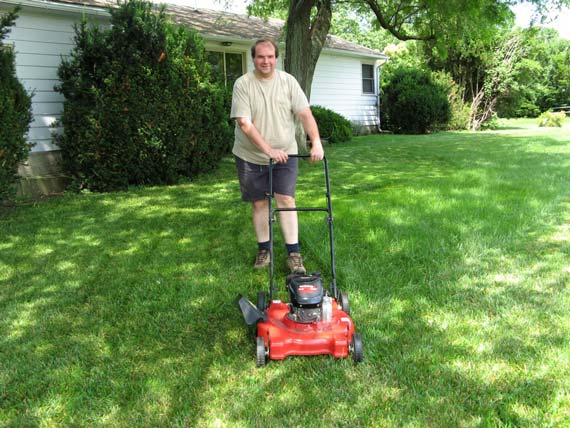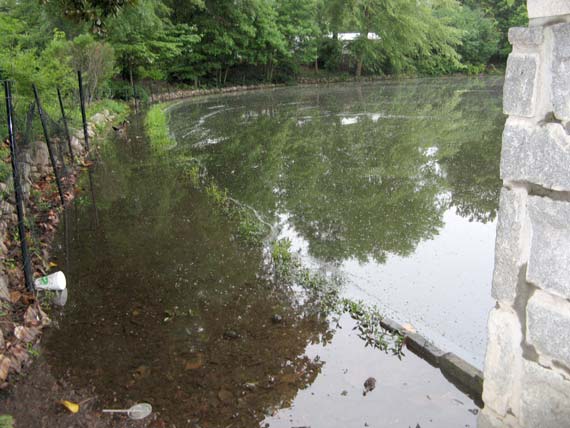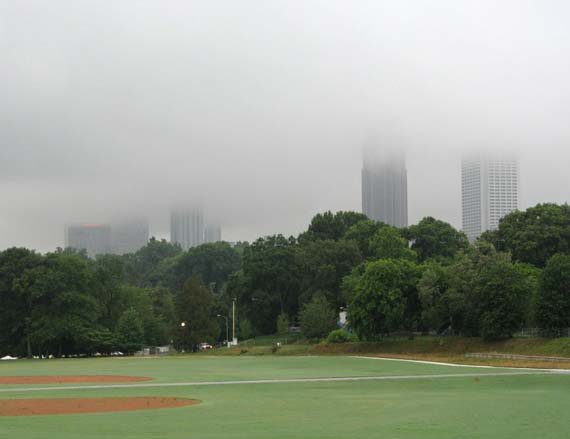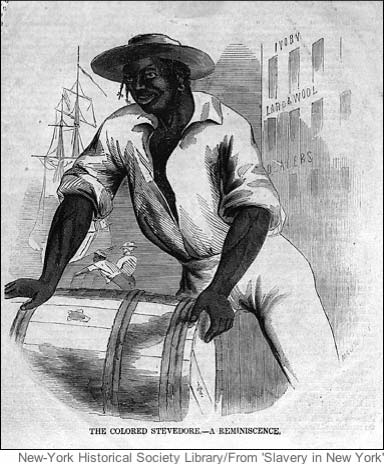Musings

The trek continues; we left the So-Mich green (doesn’t the Botanist’s garden look great!) bound for the northlands.
At the cottage, we found more green, some we whacked down with the Super Mower. We also found that in our absence wee grey mice and a bat had made the building their coffin. Ick.
Posted at 10:22 PM |
Comments Off on Treking on

Green. ’Tis the green season here in So-Mich. Peaches are green. Lettuce is green (and bolted). Time to pick peas.
Thanks to jcb for taking over my long-time chore, walking behind the ol’ Briggs & Stratton.
Posted at 8:26 PM |
1 Comment »

All this rain, and Lake Clara Meer’s in flood. Just in time for the July heat wave….
Posted at 10:22 PM |
Comments Off on Flooding!

I’m really grooving on having the Dictionary application open as I write (yeah! Macs!). It’s beyond helpful! I probably have confused these three since we did homonyms in Fifth Grade….
A trio of frequently confused words is eminent, imminent, and immanent. Eminent means ‘outstanding, famous’: the book was written by an eminent authority on folk art. Imminent means ‘about to happen’: people brushed aside the possibility that war was imminent. Immanent, often used in religious or philosophical contexts, means ‘inherent’: he believed in the immanent unity of nature taught by the Hindus.
Okay, if you want more content, here’s a story about India’s political economy. I see so many stories about about China, but stories about India tend to have a narrow scope, so I found this one thought-provoking.
India is poised at a key moment in its history. Rapid growth will likely continue — and even accelerate. But India cannot take this for granted. Public debt is high, which discourages investment in needed infrastructure. Overly strict labor laws, though they cover only 10 percent of the work force, have the perverse effect of discouraging employers from hiring new workers. The public sector, although much smaller than China’s, is still too large and inefficient — a major drag on growth and employment and a burden for consumers. And although India is successfully generating high-end, capital- and knowledge-intensive manufacturing, it has failed to create a broad-based, labor-intensive industrial revolution — meaning that gains in employment have not been commensurate with overall growth. Its rural population, meanwhile, suffers from the consequences of state-induced production and distribution distortions in agriculture that result in farmers’ getting only 20 to 30 percent of the retail price of fruits and vegetables (versus the 40 to 50 percent farmers in the United States get).
Apologies—too fried to write more….
Posted at 9:54 PM |
1 Comment »

I took a solo walk this morning, the most common route to Piedmont Park, then a loop around the best parts. I noticed the fog (?) sitting on the tall buildings and thought, naively, hey, it might rain soon. Soon was an underestimate. I got drenched within five minutes.
And at the house? Not a drop from that cell!
I found a Bigleaf Magnolia leaf to drape over my hand and camera, the jungle version of an umbrella…. Otherwise, I arrived home dripping!
Posted at 8:16 PM |
Comments Off on Rain cell

Is this a petunia? I can’t remember….
Today’s NYT has the obituary of Sir Peter Henry Berry Otway Smithers, who retired from being a spy for Britain in WWII, and later a diplomat and statesman, to grow a reportedly fantastic garden in Switzerland. During his spy days, he worked for Ian Fleming, and may have been a model for James Bond (or not). In retirement, he was quite the floral photographer, noting “What are flowers but sex in action? The bee performs the wedding. I take the pictures on the wedding day. Two days later, the flowers are exhausted.�?
I am not saying this has anything to do with why I enjoy taking flower pictures.
Speaking of plants, the best news in Big A-Town: rain. Rain most of the night, and most of this afternoon. Still, too much of it is running off, but it’s seeping in more than I had thought it would. As a result, JCB and I did some weed-removal this morning in between storm cells so they wouldn’t proliferate from the moisture inputs.
Posted at 3:30 PM |
Comments Off on Floral exhaustion

This bud’s for you!
The June 19th New Yorker has a quote from the Walden Colorado Jackson County Star:
On Aug. 9, a gate was left open along Highway 14 west of Walden and several head of cattle left a perfectly good pasture with some of the lushest grass in years to go stand on asphalt.
Three things:
- 1. They waited a year to print this?
- 2. Cattle are dumb, really dumb (but I guess most city people don’t know it).
- 3. From the cattle’s perspective, the objective was to escape.
Posted at 3:16 PM |
Comments Off on Cattle perspective

Along with population growth, think about basic resources, like potable water, and The Future….
Intensification of production generally entails increased costs, of one form or another. In agriculture, say you are a subsistence farmer, and you decide you need to expand your field into an area you previously avoided because of its slope. So you get out the kids and uncles and other hangers-on, and put together a work party and grub up some rocks and do some terraforming and, presto, you have some terraces that make your new field flatter and allow it to retain more moisture.
Here, Henry I. Miller and Gregory Conko (never heard of them, but Miller is at the Hoover Institution at Stanford) discuss several facets of modern agricultural intensification. They make some points I’ll summarize here about two big crops here in North America: maize and potatoes (both new world species, let me add).
Maize (you may call it corn) is susceptible to a mold called Fusarium, which produces a deadly fungal toxin, especially in grains damaged by insect invaders. This is just the situation in the Third World—and organic fields in our own US (and Canada). Thus, organic maize is more likely to be hazardous to your health from eating it than non-organic cornmeal grown from seeds that are genetically resistant through gene-splicing to corn borers (called Bt corn).
Similarly, potatoes are a mega-crop in the US that supplies French fries to every mouth around nearly once a day on average. Potatoes can be gene-spliced with a gene from the same bacterium used for the maize mentioned above (Bacillus thuringiensis) and another gene from elsewhere and they will be more resistant to the Colorado potato beetle and another the potato leaf roll virus, meaning reduced use of insecticides that endanger the health of farm workers.
Cautious consumers have rejected both genetic alterations.
See, more food production is necessary to support a burgeoning population, and sometimes easy, low-impact changes can be instituted at first to kick up production, but then it gets more complicated. Even making a bigger garden can have a downside—fewer trees for firewood, for example, or medicinal plants (“weeds�?) being squeezed out, or fewer pollinating insects. When you get to monocropping, the only way we now have to feed the global population at current levels (and they’re still rising, mind you), you’re facing a wealth of ethical decisions with unending implications.
So, if you buy organic because you think it’s better for the environment, you better rethink that. If you buy organic because you think it’s better for your health, which I used to think was a good argument, you have to rethink that, too. If you buy organic because you think it sends a message to policy-makers, you’d best put at least some of your $$ toward various population control programs, it seems to me. And, hey, good luck. To all of us.
Posted at 4:01 PM |
3 Comments »

Interesting etymology for “stevedore.”? It’s a corruption of the Spanish “estivador”? meaning one who stows cargo. So, no shift in the meaning….
Is the most prominent stevedore in popular American culture Marlon Brando’s character, Terry Malloy, in On the Waterfront (1954—thank you imdb)?
I guess, at least for a while, my grandfather from the Old World, was a stevedore. Or some kind of dockworker, anyway. If I got the family story right!
—found this image on the internet. I wonder about the odors that accompanied this place. What might a Lard & Wool Dealers business smell like? Plus rotting flotsam and jetsam in the water…. Ick.
Oh, and happy 14th BRB!
Posted at 5:19 PM |
Comments Off on Stevedore (randomly)

From the first SD card of images (room for only five at full pixel-potential). And yes, a new 1 gig card is in our immediate future!
JCB and I took a dive the other day and ordered a Canon Powershot A700, which enables us to return to the point-and-shoot photography world. Brown delivered it on schedule this afternoon, and, wheeooo!, life is good!
Well, probably the bigger boost to positive energy in this household today is from the now completely installed tankless water heater. I know it’s mundane, but after being without hot showers for a week, we’re glad to have little Mr. Bosch down in the basement hanging out waiting for the summons to generate some heat!
Generally, JCB and I do a poor job of being consumers compared to the average, but this week we’re measuring up. Should I be sad? Embarrassed? Proud?
Posted at 6:33 PM |
Comments Off on New camera!









